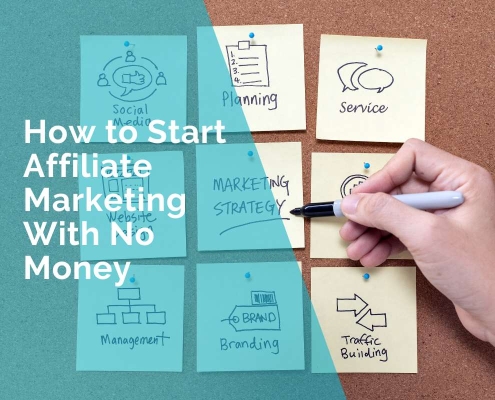Do’s and Don’ts of Affiliate Marketing
Affiliate marketing is a powerful strategy where individuals or companies promote products or services for others and earn a commission for each sale or action generated through their marketing efforts. In simple terms, it’s like being a virtual salesperson, earning a commission for every successful referral.
Understanding the dos and don’ts of affiliate marketing is crucial for anyone looking to succeed in this industry. Just like any other business endeavour, there are right and wrong ways to approach affiliate marketing. By understanding what works and what doesn’t, you can maximize your earnings potential while also building a reputable and sustainable affiliate marketing business.
Whether you’re a beginner just starting or an experienced affiliate marketer looking to fine-tune your strategies, this article will provide valuable insights to help you achieve success in the competitive world of affiliate marketing. So, let’s dive in and explore the dos and don’ts that can make or break your affiliate marketing business.
Dos of Affiliate Marketing
Choose the Right Niche
Choosing the right niche is like laying the foundation for your affiliate marketing business. It’s essential to select a niche that aligns with your interests, expertise, and target audience’s needs. Let’s take an example: Suppose you’re passionate about eco-friendly products and have knowledge about sustainability. In that case, you might choose the environmental sustainability niche for your affiliate marketing efforts.
Research and Select Quality Products
Once you’ve chosen your niche, the next step is to research and select quality products or services to promote. You want to ensure that the products you promote are relevant to your audience and offer genuine value. For instance, if you’re in the beauty niche, you might research and select skincare products with natural ingredients that have positive reviews and testimonials from satisfied customers.
Build a Trustworthy Brand
Building a trustworthy brand is essential for long-term success in affiliate marketing. Your audience should trust your recommendations and perceive you as an authority in your niche. You can achieve this by consistently providing valuable content, being transparent about your affiliations, and maintaining integrity in your marketing efforts. For example, if you’re an affiliate marketer in the personal finance niche, you might establish trust by sharing personal finance tips, budgeting strategies, and success stories with your audience.
Disclose Affiliate Relationships
Transparency is key in affiliate marketing. It’s essential to disclose your affiliate relationships to your audience to maintain trust and credibility. Whether you’re promoting a product through a blog post, social media post, or email newsletter, always clearly disclose your affiliate links or relationships. For instance, you might include a disclaimer at the beginning or end of your content stating that you may earn a commission if readers make a purchase through your affiliate links.
Provide Value to Your Audience
Your primary goal as an affiliate marketer should be to provide value to your audience. Focus on solving their problems, addressing their needs, and delivering content that enriches their lives. For example, if you’re in the parenting niche, you might create content that offers parenting tips, product recommendations, and support for fellow parents.
Utilize Multiple Traffic Sources
Diversifying your traffic sources is crucial for reaching a broader audience and minimizing risk. Instead of relying solely on one traffic source, such as organic search or social media, explore various channels like search engine optimization (SEO), social media marketing, email marketing, influencer partnerships, and paid advertising. For instance, if you’re promoting travel-related products as an affiliate marketer, you might leverage SEO to rank for travel-related keywords, while also running targeted ads on social media platforms like Facebook and Instagram.
Test and Track Performance
Testing and tracking your performance is essential for optimizing your affiliate marketing efforts and maximizing your return on investment (ROI). Use analytics tools to monitor key metrics such as click-through rates, conversion rates, and revenue generated. Experiment with different strategies, content formats, and promotional tactics to see what resonates best with your audience. For example, if you’re promoting fitness products as an affiliate marketer, you might A/B test different landing pages, email subject lines, and call-to-action buttons to determine which combinations drive the highest conversions.
Cultivate a Relationship with Your Audience
Building a strong relationship with your audience is critical for long-term success in affiliate marketing. Engage with your audience regularly through social media, email newsletters, blog comments, and community forums. Listen to their feedback, answer their questions, and address their concerns. For example, if you’re promoting pet products as an affiliate marketer, you might engage with pet owners on social media by sharing cute photos of your own pets, asking for pet-related advice, and participating in online discussions about pet care.
Focus on Content Quality
High-quality content is the cornerstone of effective affiliate marketing. Create content that is informative, engaging, and valuable to your audience. Whether you’re writing blog posts, creating videos, or recording podcasts, focus on providing valuable insights, actionable tips, and helpful recommendations. For example, if you’re promoting cooking gadgets as an affiliate marketer, you might create video tutorials demonstrating how to use the products to prepare delicious recipes.
Keep Learning and Adapting
The affiliate marketing landscape is constantly evolving, so it’s essential to stay informed about industry trends, changes in consumer behavior, and new marketing strategies. Keep learning from reputable sources, attending industry events, and networking with other affiliate marketers. Be open to trying new approaches and adapting your strategies based on what works best for your audience. For example, if you’re promoting fashion products as an affiliate marketer, you might stay updated on the latest fashion trends, social media algorithms, and influencer marketing techniques to stay ahead of the curve.
Build a Strong Email List
One of the most valuable assets in affiliate marketing is a strong email list. Building an email list allows you to nurture relationships with your audience, deliver targeted content, and promote affiliate products effectively. Offer incentives such as free guides, exclusive discounts, or downloadable resources to encourage visitors to subscribe to your email list. For instance, if you’re promoting digital marketing tools as an affiliate marketer, you might offer a free eBook on digital marketing strategies in exchange for email sign-ups.
Establish a Clear Call-to-Action
A clear call-to-action (CTA) is essential for guiding your audience towards the desired action, whether it’s making a purchase, signing up for a newsletter, or downloading a resource. Use compelling language and visually appealing buttons to prompt action from your audience. For example, if you’re promoting financial planning services as an affiliate marketer, you might include a CTA button on your website that says “Start Planning Your Financial Future Today” to encourage visitors to take the next step.
Engage with Your Audience on Social Media
Social media platforms provide excellent opportunities for affiliate marketers to connect with their audience, share valuable content, and promote affiliate products. Engage with your audience by posting regularly, responding to comments and messages, and participating in relevant conversations. Use hashtags and social media analytics to increase your reach and visibility. For instance, if you’re promoting wellness products as an affiliate marketer, you might use Instagram to share healthy lifestyle tips, workout routines, and product recommendations with your followers.
Offer Incentives or Bonuses
Offering incentives or bonuses can motivate your audience to take action and increase conversions. Whether it’s a limited-time discount, a free gift, or access to exclusive content, incentives can sweeten the deal and persuade potential customers to make a purchase. For example, if you’re promoting online courses as an affiliate marketer, you might offer a bonus webinar or downloadable workbook to anyone who purchases through your affiliate link.
Be Transparent About Your Experience with Products
Authenticity is key in affiliate marketing. Be transparent about your experience with the products or services you’re promoting, including both the pros and cons. Share personal anecdotes, honest reviews, and real-life examples to build trust with your audience. For example, if you’re promoting skincare products as an affiliate marketer, you might share before-and-after photos of your own skin transformation and discuss your experience using the products.
Develop a Personal Connection with Your Audience
Building a personal connection with your audience can set you apart from other affiliate marketers and strengthen your relationship with your audience. Share personal stories, insights, and behind-the-scenes glimpses into your life to humanize your brand and connect with your audience on a deeper level. For example, if you’re promoting travel gear as an affiliate marketer, you might share travel photos, stories from your adventures, and tips for exploring new destinations with your audience.
Diversify Your Income Streams
Diversifying your income streams can provide stability and flexibility in your affiliate marketing business. Instead of relying solely on affiliate commissions, explore other monetization opportunities such as sponsored content, digital products, online courses, and consulting services. For example, if you’re promoting home decor products as an affiliate marketer, you might also offer interior design services or sell digital design templates on your website.
Provide Honest Reviews and Recommendations
Honesty and integrity are paramount in affiliate marketing. Provide genuine reviews and recommendations based on your personal experience and expertise. Avoid exaggerating claims or promoting products solely for the sake of earning commissions. Your audience will appreciate your honesty and be more likely to trust your recommendations in the future. For example, if you’re promoting productivity tools as an affiliate marketer, you might compare different tools based on features, pricing, and user reviews to help your audience make informed decisions.
Network with Other Affiliates and Industry Professionals
Networking with other affiliates and industry professionals can provide valuable opportunities for collaboration, learning, and growth. Join affiliate marketing forums, attend industry events, and connect with like-minded individuals in your niche. Collaborate on joint ventures, share insights and strategies, and support each other’s businesses. For example, if you’re promoting pet products as an affiliate marketer, you might partner with other pet bloggers or influencers to co-host giveaways, share guest posts, or cross-promote each other’s content.
Invest in Yourself and Your Business
Investing in yourself and your business is essential for long-term success in affiliate marketing. Continuously educate yourself, acquire new skills, and invest in tools and resources that will help you grow your business. Whether it’s attending online courses, hiring a mentor, or purchasing software to streamline your workflows, investing in yourself will pay off in the long run. For example, if you’re promoting digital marketing services as an affiliate marketer, you might invest in advanced marketing courses, attend industry conferences, and hire a coach to help you sharpen your skills and stay ahead of the competition.
“In affiliate marketing, trust is your greatest asset. Be genuine, transparent, and focus on delivering value to your audience. That’s the key to long-term success.“
Ivana Katz
Don’ts of Affiliate Marketing
Promote Too Many Products at Once
Promoting too many products at once can overwhelm your audience and dilute your message. Instead of bombarding your audience with endless product recommendations, focus on a select few that align closely with your niche and provide genuine value. For example, if you’re in the technology niche, avoid promoting every new gadget that hits the market and instead focus on products that solve specific problems or meet specific needs.
Spam Your Audience
Spamming your audience with excessive promotional emails, messages, or social media posts can damage your reputation and drive away potential customers. Instead, respect your audience’s inbox and social media feeds by delivering valuable content and promotions in moderation. For example, if you’re promoting fashion accessories as an affiliate marketer, avoid sending daily emails with repetitive sales pitches and opt instead for a more strategic and targeted approach.
Mislead or Deceive Your Audience
Misleading or deceiving your audience is a surefire way to lose their trust and credibility. Always be honest and transparent in your marketing efforts, and never make false claims or promises about the products or services you’re promoting. For example, if you’re promoting health supplements as an affiliate marketer, avoid exaggerating their benefits or making unsubstantiated claims about their effectiveness.
Neglect Compliance Guidelines
Neglecting compliance guidelines can land you in hot water with regulatory authorities and damage your reputation as an affiliate marketer. Familiarize yourself with the relevant laws and regulations governing affiliate marketing in your jurisdiction, including disclosure requirements, data protection laws, and advertising standards. For example, if you’re promoting financial products as an affiliate marketer, ensure that you comply with regulations such as the Federal Trade Commission’s (FTC) Endorsement Guides and the General Data Protection Regulation (GDPR).
Ignore SEO Best Practices
Ignoring SEO best practices can hinder your website’s visibility and limit your ability to attract organic traffic. Optimize your website and content for relevant keywords, improve your site’s loading speed, and build high-quality backlinks to improve your search engine rankings. For example, if you’re promoting travel destinations as an affiliate marketer, optimize your content with location-specific keywords, stunning images, and informative travel guides to attract organic traffic from search engines.
Rely Solely on Paid Traffic
Relying solely on paid traffic can drain your budget quickly and lead to unsustainable results. While paid advertising can be an effective way to drive targeted traffic to your affiliate offers, it’s essential to diversify your traffic sources and invest in long-term strategies like content marketing, SEO, and email marketing. For example, if you’re promoting beauty products as an affiliate marketer, complement your paid advertising efforts with organic content such as beauty tutorials, product reviews, and skincare tips to attract and engage your audience.
Disregard Product Quality or Reputation
Disregarding product quality or reputation can damage your credibility and alienate your audience. Before promoting any product or service as an affiliate marketer, thoroughly research its quality, reliability, and reputation among customers. Choose products from reputable brands with positive reviews and testimonials to ensure that you’re endorsing products that meet your audience’s expectations. For example, if you’re promoting software products as an affiliate marketer, prioritize products with high user ratings, reliable customer support, and a track record of delivering value to customers.
Underestimate the Power of Email Marketing
Underestimating the power of email marketing can cause you to miss out on valuable opportunities to engage with your audience and drive conversions. Build and nurture your email list by offering valuable incentives, personalized content, and exclusive promotions to subscribers. Use email marketing automation tools to segment your audience, deliver targeted messages, and track your email campaigns’ performance. For example, if you’re promoting home decor products as an affiliate marketer, use email marketing to showcase new arrivals, share styling tips, and offer exclusive discounts to subscribers.
Engage in Black Hat Tactics
Engaging in black hat tactics such as keyword stuffing, cloaking, or buying backlinks can result in penalties from search engines and damage your website’s reputation. Instead, focus on ethical and sustainable strategies to improve your website’s visibility and attract organic traffic. For example, if you’re promoting financial services as an affiliate marketer, avoid using deceptive tactics to manipulate search engine rankings and prioritize creating high-quality content that adds value to your audience.
Overlook Analytics and Data
Overlooking analytics and data can prevent you from optimizing your affiliate marketing efforts and maximizing your ROI. Monitor key metrics such as website traffic, conversion rates, and revenue generated from affiliate sales to identify areas for improvement and refine your strategies accordingly. Use analytics tools like Google Analytics, affiliate network dashboards, and social media insights to track your performance and make data-driven decisions. For example, if you’re promoting outdoor gear as an affiliate marketer, analyze your website’s traffic sources, user demographics, and conversion paths to identify which marketing channels and campaigns are driving the most sales.
Violate Terms of Service
Violating the terms of service of affiliate programs or advertising platforms can result in account suspension or termination, jeopardizing your ability to earn commissions and damaging your reputation. Familiarize yourself with the terms and conditions of the affiliate programs you join, and adhere to their guidelines regarding promotional methods, content usage, and commission structures. For example, if you’re promoting software products as an affiliate marketer, avoid using prohibited promotional methods such as trademark bidding or incentivized clicks, which violate the terms of service of most affiliate programs.
Neglect Your Audience’s Needs and Preferences
Neglecting your audience’s needs and preferences can lead to disengagement and decreased conversions. Take the time to understand your audience’s pain points, interests, and preferences through surveys, feedback, and social listening. Tailor your content and promotional strategies to address their specific needs and provide solutions to their problems. For example, if you’re promoting fitness products as an affiliate marketer, create content that addresses common fitness challenges, offers workout routines, and recommends products that align with your audience’s fitness goals and preferences.
Chase Short-Term Gains at the Expense of Long-Term Success
Chasing short-term gains at the expense of long-term success can undermine your credibility and sustainability as an affiliate marketer. Avoid prioritizing quick wins or promoting low-quality products solely for the sake of earning commissions. Instead, focus on building a reputable brand, fostering trust with your audience, and delivering consistent value over time. For example, if you’re promoting digital marketing services as an affiliate marketer, prioritize building long-term relationships with clients, delivering exceptional results, and positioning yourself as a trusted advisor in your niche, rather than chasing short-term profits.
Forget to Disclose Affiliate Links
Forgetting to disclose affiliate links can violate disclosure guidelines and erode your audience’s trust. Always disclose your affiliate relationships transparently and prominently to your audience, whether it’s through a disclaimer on your website, a hashtag on social media, or a verbal disclosure in your content. Failure to disclose affiliate links can also result in penalties from regulatory authorities and affiliate networks. For example, if you’re promoting fashion products as an affiliate marketer on Instagram, ensure that you include a clear and conspicuous disclosure such as “#ad” or “Affiliate link” in your post captions to inform your audience about your affiliate relationships.
Ignore Feedback from Your Audience
Ignoring feedback from your audience can prevent you from addressing their needs and improving your affiliate marketing efforts. Pay attention to comments, messages, and reviews from your audience, and use their feedback to refine your content, products, and promotional strategies. Engage with your audience actively, respond to their questions and concerns, and demonstrate that you value their input. For example, if you’re promoting cooking appliances as an affiliate marketer, listen to feedback from your audience about their preferences, cooking challenges, and product recommendations, and incorporate their suggestions into your content and promotions.
Depend Too Heavily on a Single Affiliate Program
Dependence on a single affiliate program can leave you vulnerable to changes in commission rates, program terms, or affiliate network policies. Diversify your affiliate partnerships and income streams to spread your risk and maximize your earning potential. Join multiple affiliate programs within your niche, explore different affiliate networks, and consider promoting a mix of physical and digital products to diversify your revenue sources. For example, if you’re promoting health and wellness products as an affiliate marketer, join multiple affiliate programs for supplements, fitness equipment, and wellness services to diversify your income streams and mitigate the impact of changes in any single program.
Sacrifice Your Credibility for a Sale
Sacrificing your credibility for a sale can damage your reputation and erode trust with your audience. Avoid making exaggerated claims or endorsing products that you haven’t personally vetted or believe in. Your audience’s trust is your most valuable asset as an affiliate marketer, so prioritize honesty, transparency, and authenticity in your promotional efforts. For example, if you’re promoting personal finance apps as an affiliate marketer, only recommend apps that you’ve thoroughly researched, tested, and believe will genuinely help your audience manage their finances effectively.
Underestimate the Importance of Patience and Persistence
Underestimating the importance of patience and persistence can lead to frustration and burnout in affiliate marketing. Building a successful affiliate marketing business takes time, effort, and perseverance. Stay focused on your goals, stay consistent with your efforts, and be patient as you build your audience and grow your revenue over time. Success in affiliate marketing doesn’t happen overnight, so maintain a long-term perspective and keep pushing forward, even when faced with challenges or setbacks. For example, if you’re promoting home improvement products as an affiliate marketer, be patient as you build your audience and establish your brand, and persistently create valuable content and promote high-quality products to attract and retain customers.
Engage in Unethical Practices
Engaging in unethical practices such as manipulating reviews, plagiarizing content, or engaging in deceptive marketing tactics can damage your reputation and harm your audience. Always prioritize integrity, honesty, and transparency in your affiliate marketing efforts, and avoid cutting corners or resorting to unethical tactics to boost your sales or rankings. Your reputation as an affiliate marketer depends on your credibility and trustworthiness, so uphold high ethical standards in all your interactions and promotions. For example, if you’re promoting skincare products as an affiliate marketer, avoid using before-and-after photos that are digitally altered or misleading, and ensure that your marketing claims are truthful and backed by evidence.
Give Up Too Soon
Giving up too soon can prevent you from realizing your full potential and achieving success in affiliate marketing. Building a profitable affiliate marketing business takes time, persistence, and resilience in the face of challenges and setbacks. Stay committed to your goals, stay adaptable to changes in the industry, and stay patient as you navigate the ups and downs of the affiliate marketing journey. Success rarely comes easy, so keep pushing forward, keep learning and growing, and keep believing in yourself and your ability to succeed as an affiliate marketer. For example, if you’re promoting digital products as an affiliate marketer and facing slow growth or low conversions, don’t give up prematurely; instead, reassess your strategies, seek feedback from mentors or peers, and pivot as needed to improve your results and achieve your goals.
Ethical and strategic affiliate marketing is not just about making sales; it’s about building trust, delivering value, and creating long-term relationships with your audience. By prioritizing integrity, transparency, and authenticity in your marketing efforts, you can earn the respect and loyalty of your audience while also maximizing your earning potential.
Strategic affiliate marketing involves continually refining your strategies, experimenting with new approaches, and staying informed about industry trends and best practices. By staying adaptable and willing to learn, you can stay ahead of the curve and position yourself for success in the ever-evolving landscape of affiliate marketing.
As you continue your affiliate marketing journey, remember that learning and improvement are ongoing processes. Stay curious, stay open-minded, and stay committed to growing and evolving as an affiliate marketer. Seek out new opportunities for learning, whether it’s through online courses, industry conferences, or networking with other affiliates.
Never underestimate the power of continuous improvement in affiliate marketing. By staying proactive, staying resilient, and staying focused on delivering value to your audience, you can achieve your goals and build a thriving affiliate marketing business for years to come. Keep learning, keep growing, and keep pushing forward on your path to success.
Additional Resources
Further Reading:
- “Affiliate Marketing for Beginners” by Ray Hamilton: A comprehensive guide to getting started with affiliate marketing.
- “Affiliate Marketing: Secrets” by Chandler Wright: Insights into advanced strategies for successful affiliate marketing.
- Neil Patel’s Blog: Articles on affiliate marketing strategies and tips from a renowned digital marketing expert.
- Authority Hacker: In-depth articles and guides on building successful affiliate websites.
Online Courses:
- Udemy – Affiliate Marketing Course for Beginners: Covers the basics and advanced strategies of affiliate marketing.
- Coursera – Affiliate Marketing: A Practical Guide: Offers practical knowledge and tips for affiliate marketing success.
- Skillshare – Affiliate Marketing for Beginners: Tutorials on how to start and grow your affiliate marketing business.
Tools and Platforms:
Affiliate Networks:
- Amazon Associates: One of the most popular affiliate programs with a wide range of products.
- ShareASale: Connects affiliates with merchants offering a variety of products and services.
- CJ Affiliate: Provides a broad selection of high-quality affiliate programs.
Content Creation Tools:
- Canva: Design tool for creating engaging visuals and graphics for your content.
- Grammarly: Helps in producing error-free and polished written content.
- BuzzSumo: Identifies popular content and trends in your niche.
SEO Tools:
- Ahrefs: Comprehensive tool for keyword research, backlink analysis, and competitor analysis.
- SEMrush: All-in-one marketing toolkit for improving online visibility.
- Yoast SEO (for WordPress): Optimizes your content for search engines.
Analytics and Tracking:
- Google Analytics: Tracks and reports website traffic and affiliate link performance.
- Pretty Links (for WordPress): Manages and tracks affiliate links on your website.
- ClickMeter: Monitors clicks and conversions for your affiliate campaigns.
Email Marketing:
- GetResponse: Popular email marketing platform to engage with your audience.
- ConvertKit: Tailored for bloggers and affiliate marketers to build email lists and nurture leads.
- AWeber: Email marketing tool with automation features for affiliate marketers.
Frequently Asked Questions
What is affiliate marketing and how does it work?
Affiliate marketing is a performance-based marketing strategy where an affiliate earns a commission for promoting another company’s products or services. It works through a simple process:
- Join an Affiliate Program: Choose a company or network that offers affiliate programs.
- Get a Unique Affiliate Link: Receive a unique tracking link to promote the company’s products.
- Promote the Products: Share the link on your website, blog, social media, or other platforms.
- Earn Commissions: When someone clicks on your link and makes a purchase, you earn a commission. The company tracks these sales using your unique link.
How many products should I promote at once as an affiliate marketer?
It’s best to focus on promoting a select few products that align closely with your niche and provide genuine value to your audience. Promoting too many products at once can overwhelm your audience and dilute your message.
Is it okay to send frequent promotional emails to my audience?
No, it’s not advisable to spam your audience with excessive promotional emails. Instead, focus on delivering valuable content and promotions in moderation to respect your audience’s inbox and social media feeds.
Do I need to disclose my affiliate relationships to my audience?
Yes, it’s essential to disclose your affiliate relationships transparently and prominently to your audience to maintain trust and comply with disclosure guidelines.
Is email marketing important for affiliate marketers?
Yes, email marketing is an essential tool for affiliate marketers to engage with their audience, deliver targeted content, and promote affiliate products effectively.
How important is it to track and analyze my affiliate marketing performance?
Tracking and analyzing your performance is crucial for optimizing your affiliate marketing efforts, identifying areas for improvement, and maximizing your ROI.
How do I choose the right affiliate program?
Choosing the right affiliate program involves several key factors:
- Relevance: Select programs that align with your niche and audience interests.
- Commission Rates: Compare the commission rates offered by different programs. Higher rates can be more lucrative.
- Product Quality: Ensure the products are of high quality and reputable, as this affects your credibility.
- Support and Resources: Look for programs that offer marketing materials, support, and resources to help you succeed.
- Payment Terms: Understand the payment thresholds and frequency. Some programs pay monthly, while others might have a higher threshold for payouts.
How can I drive traffic to my affiliate links?
Driving traffic to your affiliate links requires a multi-faceted approach:
- Content Creation: Produce high-quality, valuable content such as blog posts, videos, and tutorials that naturally incorporate your affiliate links.
- SEO: Optimize your content for search engines to increase organic traffic. Use relevant keywords, meta tags, and backlinks.
- Social Media: Share your content and affiliate links on social media platforms. Engage with your audience and join relevant groups or communities.
- Email Marketing: Build an email list and send newsletters featuring your affiliate products.
- Paid Advertising: Use Google Ads, Facebook Ads, or other paid advertising methods to drive targeted traffic to your content.
How long does it take to see results from affiliate marketing?
The time it takes to see results from affiliate marketing varies based on several factors:
- Content Quality and Consistency: Regularly producing high-quality content can accelerate results.
- SEO and Traffic: The more traffic you drive to your site, the quicker you may see conversions. SEO can take several months to show significant results.
- Niche Competitiveness: In less competitive niches, you might see results faster. Highly competitive niches may take longer.
- Marketing Strategy: A well-rounded strategy including content marketing, social media, and email marketing can speed up results.
- Persistence and Patience: Affiliate marketing requires dedication and persistence. It might take several months to a year to build a substantial income.
 Ivana Katz from Websites 4 Small Business is an award winning web designer who builds websites that build your business. She provides unbeatable web design services to fit your budget.
Ivana Katz from Websites 4 Small Business is an award winning web designer who builds websites that build your business. She provides unbeatable web design services to fit your budget.
The end result? Professional, custom-made sites that give your business the extra oomph it needs to stand out from the competition and make an impact.
Whether you’re a brand-new business or an established one ready to improve your digital presence, Ivana makes it easy to get your business online very quickly. Her websites are professional, tailored to fit your budget, and give your business a serious boost.
Download your FREE copy of “Ultimate Website Design Secrets Blackbook – 10 Bulletproof Strategies for Designing an Outrageously Successful Website”












